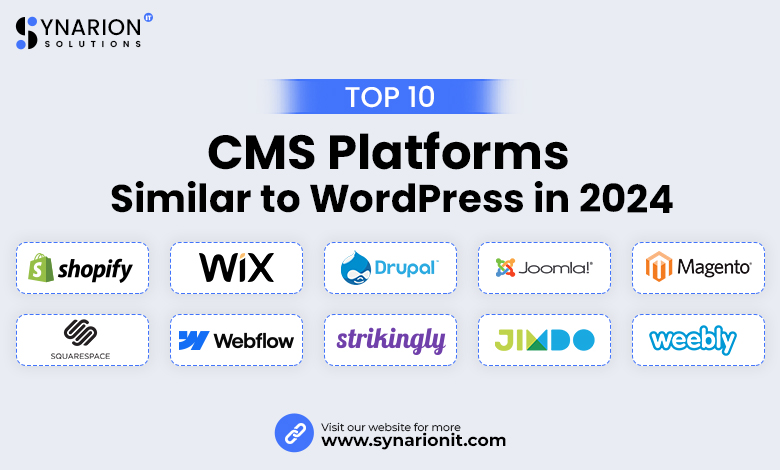Top 10 CMS Platforms Similar to WordPress in 2024

Introduction
Content Management Systems (CMS) play a pivotal role in web development, offering diverse features and functionalities to cater to various needs and preferences. While WordPress remains a dominant force, several other platforms have emerged as strong contenders, each with its unique strengths and capabilities. Here’s an in-depth exploration of the top 10 CMS platforms similar to WordPress in 2024:
1. Shopify
Shopify is renowned for its specialized focus on e-commerce solutions, making it a preferred choice for businesses looking to establish or enhance their online stores. Unlike WordPress, which serves a broader range of website types, Shopify excels in providing robust tools for managing product listings, processing payments, and optimizing online sales. It offers customizable templates, a user-friendly interface, and a vast app ecosystem that enhances functionality, making it ideal for businesses of all sizes aiming to succeed in e-commerce.
2. Wix
Wix is a versatile CMS platform that caters to users with varying technical expertise. It features a drag-and-drop website builder, allowing users to create visually stunning websites without coding knowledge. Wix offers a wide range of templates, customizable design elements, and third-party integrations, making it suitable for personal portfolios, small businesses, and large enterprises alike.
3. Drupal
Drupal is an open-source CMS known for its flexibility and scalability. It is favored by developers for its robust architecture and ability to handle complex websites with extensive content management needs. Drupal offers a modular approach, allowing users to add functionalities through modules and extensions. It is suitable for large organizations, government websites, and communities requiring highly customized and secure web solutions.
4. Joomla
Joomla is another popular open-source CMS that combines ease of use with powerful features. It offers a user-friendly interface, extensive customization options, and a strong community of developers and users. Joomla is suitable for building websites ranging from personal blogs to corporate portals, e-commerce stores, and social networking platforms. It provides flexibility in design and functionality, making it a versatile choice for diverse web projects.
5. Magento
Magento is a CMS platform specifically designed for e-commerce websites. Known for its scalability and robust performance, Magento offers extensive customization options, advanced SEO capabilities, and comprehensive e-commerce features. It caters to businesses of all sizes, from small startups to large enterprises, seeking to create sophisticated online stores with seamless shopping experiences and efficient management tools.
6. Squarespace
Squarespace is a popular CMS platform that emphasizes design and aesthetics. It offers elegant templates, intuitive drag-and-drop editing tools, and built-in e-commerce functionalities. Squarespace is known for its user-friendly interface and responsive designs, making it suitable for creative professionals, artists, photographers, and small businesses looking to showcase their work or products online effectively.
7. Webflow
Webflow combines CMS capabilities with powerful design tools, offering a visual development platform for creating responsive websites. It features a visual editor, customizable templates, and the ability to design and publish websites without writing code. Webflow is favored by designers and agencies for its flexibility, collaborative features, and advanced interactions, making it ideal for creating visually stunning and interactive websites.
8. Strikingly
Strikingly is a CMS platform focused on simplicity and ease of use. It specializes in creating single-page websites quickly and efficiently, making it suitable for individuals, freelancers, and small businesses looking to establish a minimalistic online presence. Strikingly offers responsive templates, integrated e-commerce options, and SEO tools, allowing users to build and manage websites effortlessly.
9. Jimdo
Jimdo is a user-friendly CMS platform that simplifies website creation for individuals and small businesses. It offers customizable templates, a drag-and-drop editor, and integrated e-commerce capabilities. Jimdo is designed for users seeking a straightforward approach to building and managing websites without technical complexities. It supports multilingual websites, SEO optimization, and mobile-responsive designs, catering to a global audience.
10. Weebly
Weebly is a versatile CMS platform known for its ease of use and extensive features. It offers a drag-and-drop website builder, customizable templates, and integrated e-commerce solutions. Weebly is suitable for users ranging from bloggers and entrepreneurs to large businesses looking to create professional-looking websites with minimal effort. It provides robust SEO tools, mobile-responsive designs, and third-party integrations, making it a flexible choice for diverse web projects.
Conclusion
Choosing the right CMS platform is crucial for businesses and individuals looking to build effective websites that meet their specific needs and objectives. While WordPress remains a dominant force in the CMS landscape, the platforms listed above offer viable alternatives with unique strengths and capabilities.
WordPress website development continues to evolve with advancements in technology and user expectations. Businesses seeking to leverage these CMS platforms should consider their specific requirements, such as e-commerce functionalities, design flexibility, scalability, and ease of use. Whether you opt for Shopify’s specialized e-commerce solutions, Wix’s intuitive website builder, or Drupal’s robust customization capabilities, each platform offers opportunities to create compelling online experiences and achieve digital success.



